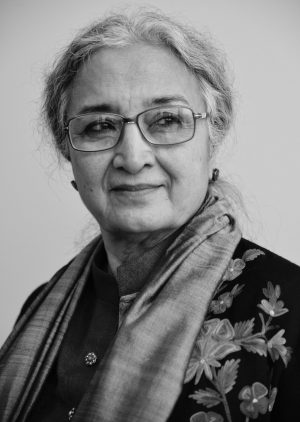
Khawar Mumtaz is the type of person who when faced with injustice knew she had to do something to confront it. The 1970s in Pakistan were a particularly dark time in a country who has had its share of dark times. The politics of authoritarianism and repression were on the rise and the rights of the average citizen were on the decline. In this moment entered an unlikely voice—a woman, a scholar, an activist.
Ms. Mumtaz spoke at the University of Utah on Thursday, March 23 on the topic of Women’s Economic Empowerment in the Changing World. The event was sponsored by the University’s Office of Global Engagement, and her lecture was preceded by a talk presented by United States District Judge Jill Parrish on the universal struggle women face for equity in the work place.
Born in 1945, in the mists of the Nationalist movement for independence in India, Ms. Mumtaz has lived through moments of tumult and change. From an early age she was exposed to educated and empowered women who served as role models for the way a woman can operate in this world. Her mother’s aunt was the revered Ismat Chugtai, one of the leading Indian feminist of her generation. Ms. Chugtai provided a vivid example of a liberated and successful woman; a writer of fiction, educated, strong willed—a visionary. “Her shadow on the entire family was very strong,” Ms. Mumtaz recalls.
The early days of the Indian Nationalist movement had an unintended consequence when it came to the role and the rights of women. Women in those days were encouraged to participate in politics. “Times of great upheaval offer the opportunity for a change in perception.” Ms. Mumtaz views the modern woman’s rights movement as a natural outgrowth of this earlier age of women’s empowerment.
By the mid-1970s, Ms. Mumtaz had landed a prestigious job as a university professor, was married, had children, security. But history has a way of calling upon our deeper human nature when we are so pressed. By 1977 the Pakistani government had begun to enact a series of repressive laws, including one that called for the stoning to death of women accused of adultery. “I knew I had to do something,” Ms. Mumtaz recalls four decades later. In 1983 she left her position at the university after facing pressure to stop her activism. In the decades to follow she went on to be integral in the formation of the Women’s Action Forum, to lobby successfully for a series of laws aimed at protecting and enhancing the role of women in Pakistani society, and she currently serves as the Chairperson of Pakistan’s National Commission on the Status of Women.
Ms. Mumtaz sees a natural alignment between the cause of women’s rights and the movement to protect the environment, for environmental issues are fundamentally human rights issues. “What could be a more basic right than the air we breathe and the water we drink? These issues are fundamental to survival.” She also feels that environmental issues and resource scarcity affect the lives of men and women differently. “In Pakistani society, women are responsible for the basics of running a household: gathering and preparing the food, fetching the water, doing the cleaning.” Droughts and floods and the unfolding effects of climate change disrupt the role that women play in tending to these basic needs. “Women are very attuned to the environment, and they are having to adapt to the changing conditions of scarcity.”
The title of her acclaimed book offers a glimpse into the decades-long struggle to secure gender equity in Pakistan, “Women in Pakistan: Two Steps Forward, One Step Back.” And yet, Ms. Mumtaz retains a sense of hope. “I am an optimist. I have seen things change over the course of my life.” She sees ahead the need for a collective awakening. “No individual makes for a cause. Individuals provide role models, but change takes place through the force of a collective voice.” At least for this generation Khawar Mumtaz offers that role model, and an empowering voice calling for collective action.
